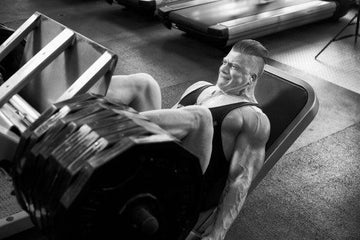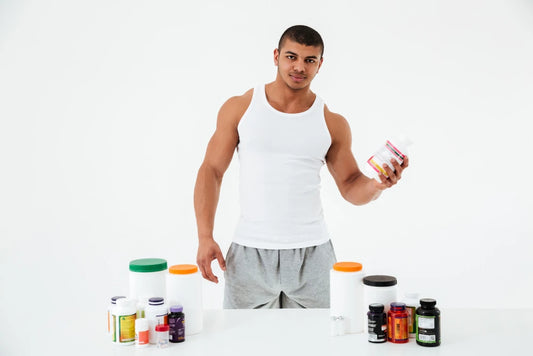

REM Science: Testosterone, Performance, and Weight Control
Table of Contents
REM Science: Testosterone, Performance, and Weight Control
by: Robbie Durand
Sleep is one of the most neglected aspects of health for most athletes. Athletes will not think twice about staying up a little later if they can get more things done. Not getting a good night’s sleep can not only affect performance but it can also impact your gains in the gym. Studies in volunteers who slept short versus long hours show that sleep reduction was accompanied by increased hunger, higher circulating concentrations of the appetite-stimulating hormone, ghrelin, and reduced levels of the anorexigenic hormone, leptin. To determine whether sleep restriction has a negative impact on the effects of a reduced-calorie diet on excess adiposity, researchers had subjects follow a similar diet but differed the duration of sleep. One group slept 8½ hours per night while the other group slept 5½ hours. Sleep curtailment decreased the fraction of weight loss of fat by 55% and increased the loss of fat-free body mass by 60%. In summary, dieting adults getting 5½ hours of sleep produced a catabolic state characterized by reduced loss of body fat and increased the loss of fat-free body mass, accompanied by increased hunger and changes in energy expenditure and the neuroendocrine control of substrate utilization. The findings should make bodybuilders aware that cutting back on sleep while dieting can not only cause a catabolic state but can also hinder fat loss gains.
Sleep and Leptin
There is increasing evidence that sleep duration, and reduced rapid eye movement sleep, are linked to obesity. Leptin is a primary appetite-regulating hormone when leptin levels are low; appetite is reduced. So not getting into that deep REM sleep is going to contribute to obesity. Leptin has central neural effects beyond modulation of appetite alone. A recent study examined the relationship between serum leptin and rapid eye movement sleep in a sample of healthy adults. Participants were 58 healthy adults who underwent a sleep study. Leptin was measured before and after sleep. It was hypothesized that a lower percentage of rapid eye movement sleep would be related to lower leptin levels during sleep. An increased percentage of rapid eye movement sleep was linked to a greater reduction in leptin during sleep even when controlling for age, gender, percent body fat and total sleep time. A higher percentage of rapid eye movement sleep was accompanied by more marked reductions in leptin. Studies examining the effects of selective rapid eye movement sleep deprivation on leptin levels, and hence on energy homeostasis in humans, are needed.
Sleep Loss Screws Up Your Testosterone Levels
Plasma testosterone levels display circadian variation (i.e. highest in the morning and gradually decreasing throughout the night), however, during sleep, testosterone peaks. Various disorders of sleep including abnormalities of sleep quality, duration, circadian rhythm disruption, and sleep-disordered breathing may result in a reduction in testosterone levels. One cross-sectional study examined the different associations of age and sleep duration with sex steroid hormones and sexual activities in 531 Asian Chinese men aged between 29 and 72 years old. Age was a significant determinant of sleep, sex steroid hormones, and sexual activities in men. Bioavailable testosterone, DHEAS, coital frequency, masturbation, and sleep duration declined with age. On the other hand, SHBG and estrogen increased with age. Sleep duration, independently of age, aerobic exercise, and body fat, was positively associated with testosterone and bioavailable testosterone, but not with DHEAS, estrogen, or any of the sexual activities studied. Men who masturbated had higher levels of both testosterone and bioavailable testosterone. DHEAS was significantly associated with coital frequency and desire for sex. The study showed that besides age, sleep duration was related to androgen concentrations in men, and thus the evaluation of sleep hygiene may be beneficial in the management of men with low androgen levels.
Get Your Sleep for Optimal Testosterone Production
Another study examined 531 healthy men as testosterone levels among subjects, and they examined how the amount of sleep correlated with their testosterone level. The results again show that the men who slept more also had significantly higher testosterone levels. In fact, the guys who slept for 4 hours had about 60% less testosterone in their serum, than the men who slept for 8 hours sleeping and male testosterone levels. If you want low testosterone levels, sleep less than four hours a night. In another study, twelve healthy men ages 64 to 74 years were examined. Three-morning blood samples were pooled for the measurement of total and free testosterone. The primary outcome measures were total sleep time and morning testosterone levels. Sleep time in the laboratory was correlated with the usual amount of nighttime sleep at home. The researchers reported that the amount of nighttime sleep measured was an independent predictor of the morning total and free testosterone levels of the subjects. The differences in the measured amount of nighttime sleep are associated with a significant part of the variability in the morning testosterone levels of healthy older men. If you want optimal testosterone levels, you should be sleeping more than eight hours a day.
Resistance Exercise Counteracts Sleep Muscle Loss
Since there are a ton of catabolic reactions that occur with sleep loss, researchers wanted to examine what would happen if your added resistance exercise to sleep restriction. Researchers had male rats were randomly allocated into different groups:
-control,
-Sleep Deprivation (for 96 hours),
-Resistance Training, and
-Resistance training + sleep deprivation.
Sleep deprivation resulted in muscle loss; however, when sleep deprivation was combined with resistance exercise, the reduction in muscle fiber loss was prevented. The levels of IGF-1 and testosterone were reduced in sleep deprivation animals, and the resistance exercise + sleep deprivation group had higher levels of these hormones than the sleep deprivation group.
Corticosterone was increased in the sleep deprivation. Interestingly, the corticosterone responses were minimized in the resistance training + sleep deprivation group. Sleep deprivation induced weight loss, but this loss was reduced in the resistance exercise + sleep deprivation. group. The researchers concluded that sleep deprivation induced muscle loss, probably because of the increased corticosterone and catabolic signal. High-intensity resistance exercise performed before sleep deprivation was beneficial in containing muscle loss induced by sleep deprivation. It also minimized the catabolic signal and increased synthetic activity, thereby minimizing the body’s weight loss.
Sleep Loss Decreases Repetitions to Fatigue
 In addition to decreasing muscle mass gains and increasing adipose tissue, the newest study suggests that sleep loss can decrease performance in the gym. For instance, a previous study reported an 11% reduction in time to exhaustion for prolonged uphill walking on a treadmill at 80% of VO2 max after sleep deprivation. Researchers wanted to find out if you had periods of excess sleep the week before the subjects were subjected to sleep restriction. Researchers had 12 healthy men participated in two experimental conditions: extended sleep (almost 10 hours of sleep) time in bed and habitual sleep (almost 8 hours of sleep in bed). In each condition, subjects performed six nights of either extended sleep or habitual sleep at home followed by an assessment of motor performance and neuromuscular function at baseline and after one night of total sleep deprivation, i.e. 34-37 h of continuous wakefulness. The researchers measured the maximal voluntary contractions of muscle fibers in both conditions. At the end of the study, the researchers found that after 10 hours of sleep, time to exhaustion was an average of 3.9% longer after six days of extended sleep compared to normal sleep. Extended sleep allowed subjects to perform about 8.1% better than average sleepers after the night of no sleep. Six nights of more sleep improved motor performance in a sustained contraction independent of testing day. Time to exhaustion was an average of 3.9% longer after six days of extended sleep compared to normal sleep. Banking all that shut-eye also reduced the effects of sleep deprivation. Extended sleep allowed subjects to perform about 8.1% better than normal sleepers after the night of no sleep
In addition to decreasing muscle mass gains and increasing adipose tissue, the newest study suggests that sleep loss can decrease performance in the gym. For instance, a previous study reported an 11% reduction in time to exhaustion for prolonged uphill walking on a treadmill at 80% of VO2 max after sleep deprivation. Researchers wanted to find out if you had periods of excess sleep the week before the subjects were subjected to sleep restriction. Researchers had 12 healthy men participated in two experimental conditions: extended sleep (almost 10 hours of sleep) time in bed and habitual sleep (almost 8 hours of sleep in bed). In each condition, subjects performed six nights of either extended sleep or habitual sleep at home followed by an assessment of motor performance and neuromuscular function at baseline and after one night of total sleep deprivation, i.e. 34-37 h of continuous wakefulness. The researchers measured the maximal voluntary contractions of muscle fibers in both conditions. At the end of the study, the researchers found that after 10 hours of sleep, time to exhaustion was an average of 3.9% longer after six days of extended sleep compared to normal sleep. Extended sleep allowed subjects to perform about 8.1% better than average sleepers after the night of no sleep. Six nights of more sleep improved motor performance in a sustained contraction independent of testing day. Time to exhaustion was an average of 3.9% longer after six days of extended sleep compared to normal sleep. Banking all that shut-eye also reduced the effects of sleep deprivation. Extended sleep allowed subjects to perform about 8.1% better than normal sleepers after the night of no sleep
Arnal PJ, Lapole T, Erblang M, Guillard M, Bourrilhon C, Leger D, Chennaoui M, Millet GY. Sleep Extension before Sleep Loss: Effects on Performance and Neuromuscular Function. Med Sci Sports Exerc. 2016 Mar 25.
Arnal PJ, Sauvet F, Leger D et al. Benefits of Sleep Extension on Sustained Attention and Sleep Pressure Before and During Total Sleep Deprivation and Recovery. Sleep. 2015;38(12):1935-43.
Kamdar BB, Kaplan KA, Kezirian EJ, Dement WC. The impact of extended sleep on daytime alertness, vigilance, and mood. Sleep Med. 2004;5(5):441-8
Martin BJ. Effect of sleep deprivation on tolerance of prolonged exercise. Eur J Appl Physiol Occup Physiol. 1981;47(4):345-54.
Martin BJ, Bender PR, Chen H. Stress hormonal response to exercise after sleep loss. Eur J Appl Physiol Occup Physiol. 1986;55(2):210-4.
Martin BJ, Chen H. Sleep loss and the sympathoadrenal response to exercise. Med Sci Sports Exerc. 1984;16:56-9.
Martin BJ, Gaddis GM. Exercise after sleep deprivation. Med Sci Sports Exerc. 1981;13(4):220-3.
Oliver SJ, Costa RJ, Laing SJ, Bilzon JL, Walsh NP. One night of sleep deprivation decreases treadmill endurance performance. Eur J Appl Physiol. 2009;107(2):155-61.
Goh VH, Tong TY. Sleep, sex steroid hormones, sexual activities, and aging in Asian men. J Androl. 2010 Mar-Apr;31(2):131-7.
Penev PD. Association between sleep and morning testosterone levels in older men. Sleep. 2007 Apr;30(4):427-32.
Resistance training minimizes catabolic effects induced by sleep deprivation in rats. Marcos Mônico-Neto, Hanna Karen Moreira Antunes, Kil Sun Lee, Stuart M. Phillips, Sara Quaglia de Campos Giampá, Helton de Sá Souza, Murilo Dáttilo, Alessandra Medeiros, Wilson Max de Moraes, Sergio Tufik, Marco Túlio de Mello. Applied Physiology, Nutrition, and Metabolism, 2015, 40:1143-1150.
MUSCLE MEDIA MAGAZINE FOR MEN
The premier source of training, nutrition, supplements, fat loss and health for men.

















